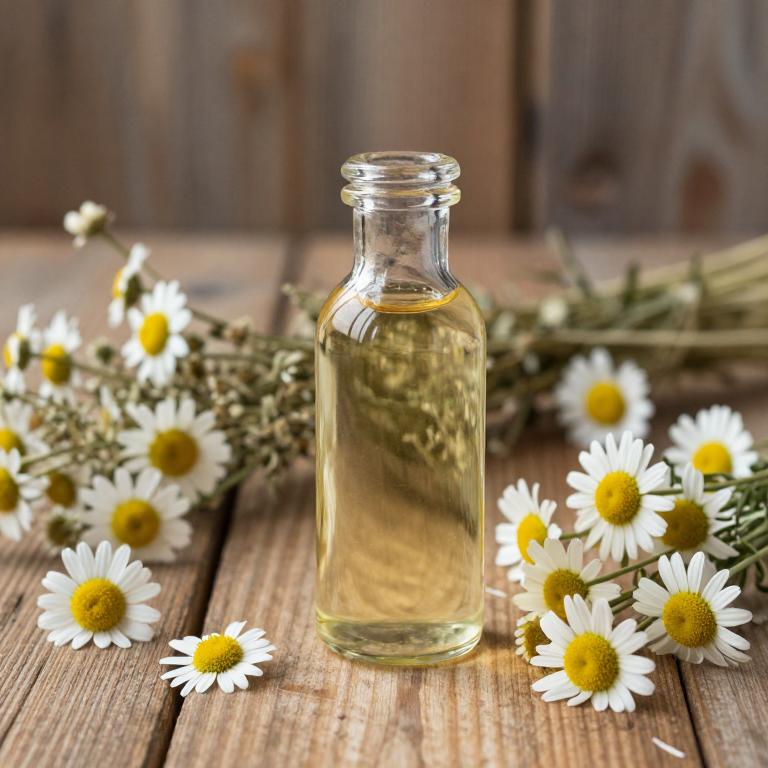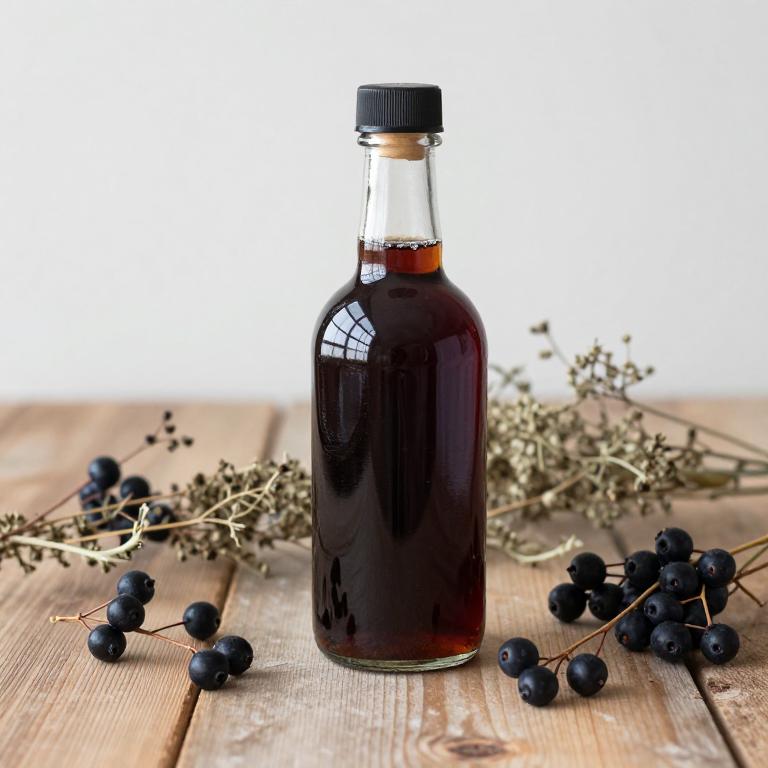10 Best Herbal Syrups For Colds

Herbal syrups for colds are natural remedies that combine plant-based ingredients to alleviate symptoms such as sore throat, congestion, and coughing.
Common herbs like echinacea, ginger, and licorice root are often included for their anti-inflammatory and immune-boosting properties. These syrups are typically easy to consume, especially for children or individuals who prefer not to take pills. They are available in various formulations, some of which may also include honey or other sweeteners to improve taste and encourage regular use.
While generally safe, it is advisable to consult a healthcare professional before use, particularly for those with allergies or chronic health conditions.
Table of Contents
- 1. Ginger (Zingiber officinale)
- 2. Echinacea (Echinacea purpurea)
- 3. Fennel (Foeniculum vulgare)
- 4. Thyme (Thymus vulgaris)
- 5. Chamomile (Matricaria chamomilla)
- 6. Licorice (Glycyrrhiza glabra)
- 7. Black elderberry (Sambucus nigra)
- 8. Stinging nettle (Urtica dioica)
- 9. Rosemary (Rosmarinus officinalis)
- 10. Chaste tree (Vitex agnus-castus)
1. Ginger (Zingiber officinale)

Zingiber officinale, commonly known as ginger, has been traditionally used for its therapeutic properties, and ginger herbal syrups are increasingly popular for alleviating cold symptoms.
These syrups often contain fresh or dried ginger root, which is known for its anti-inflammatory and antioxidant effects. They can help reduce congestion, soothe sore throats, and ease nausea associated with colds and flu. Many formulations also include honey or other natural sweeteners to enhance flavor and provide additional soothing benefits.
While generally safe for most adults, ginger syrups should be used with caution in children and individuals with specific allergies or medical conditions.
2. Echinacea (Echinacea purpurea)

Echinacea purpurea, commonly known as purple coneflower, is a popular herbal remedy used to support the immune system and alleviate cold symptoms.
Herbal syrups made from echinacea are often taken at the first sign of a cold to help reduce the severity and duration of symptoms. These syrups are typically made by extracting the active compounds from the plant's roots and flowers, which contain antioxidants and anti-inflammatory properties. While some studies suggest echinacea may offer mild benefits, its effectiveness can vary, and it is generally considered safe for most adults when used as directed.
As with any supplement, it is advisable to consult a healthcare provider before use, especially for children or individuals with allergies or chronic conditions.
3. Fennel (Foeniculum vulgare)

Foeniculum vulgare, commonly known as fennel, has been traditionally used in herbal medicine for its soothing properties, particularly in the treatment of colds and respiratory discomfort.
Fennel herbal syrups are often prepared from the dried seeds of the plant and are valued for their ability to ease coughing, reduce inflammation in the throat, and promote expectoration. These syrups are typically made by steeping the fennel seeds in a simple syrup, which enhances their aromatic and medicinal qualities. Due to their mild and pleasant taste, fennel syrups are especially suitable for children and adults alike who suffer from mild cold symptoms.
Regular consumption of fennel herbal syrup may help alleviate congestion and support the body's natural healing process during a cold.
4. Thyme (Thymus vulgaris)

Thymus vulgaris, commonly known as thyme, is a popular herb used in the preparation of herbal syrups for colds due to its potent antimicrobial and expectorant properties.
These syrups are traditionally made by infusing thyme leaves in honey or sugar syrup, creating a soothing and flavorful remedy that helps alleviate symptoms such as coughing, congestion, and sore throat. The essential oils in thyme, particularly thymol, are known to support immune function and reduce the duration of colds when consumed regularly. Many people find thyme syrup to be a natural and effective alternative to over-the-counter medications, especially for mild respiratory infections.
However, it is important to consult with a healthcare provider before using thyme syrup, especially for children, pregnant women, or individuals with existing health conditions.
5. Chamomile (Matricaria chamomilla)

Matricaria chamomilla, commonly known as chamomile, is often used in herbal syrups to alleviate symptoms of colds due to its calming and anti-inflammatory properties.
These syrups are typically made by infusing dried chamomile flowers in a base of honey or sugar syrup, which enhances their soothing effects. Chamomile is believed to help reduce congestion, ease sore throats, and promote relaxation, making it a popular remedy for mild cold symptoms. The mild, pleasant aroma of chamomile also contributes to its comforting effect on the respiratory system.
While not a cure for colds, chamomile herbal syrups can provide symptomatic relief and support the body's natural healing process.
6. Licorice (Glycyrrhiza glabra)

Glycyrrhiza glabra, commonly known as licorice root, has been traditionally used in herbal medicine for its soothing effects on the respiratory system.
Licorice root syrup is often used to alleviate symptoms of colds, such as coughing, sore throat, and inflammation due to its anti-inflammatory and expectorant properties. The active compound, glycyrrhizin, helps to reduce mucus production and ease breathing, making it a popular remedy during cold and flu seasons. However, prolonged use of licorice root syrup may lead to side effects such as high blood pressure due to its effect on the adrenal glands.
As a result, it is recommended to use licorice root syrups under the guidance of a healthcare professional, especially for individuals with hypertension or other chronic conditions.
7. Black elderberry (Sambucus nigra)

Sambucus nigra, commonly known as the European elderberry, is widely used in herbal syrups to alleviate symptoms of colds and upper respiratory infections.
These syrups are rich in antioxidants, vitamins, and anti-inflammatory compounds that help boost the immune system and reduce the duration of cold symptoms. The berries are often combined with other herbs like echinacea or ginger to enhance their therapeutic effects. Traditional use of elderberry syrup dates back centuries, with many cultures employing it as a natural remedy for flu-like symptoms.
However, it is important to use properly prepared syrups to avoid potential toxicity from unripe berries or their seeds.
8. Stinging nettle (Urtica dioica)

Urtica dioica, commonly known as stinging nettle, is a herb that has been traditionally used for its potential health benefits, including its use in herbal syrups for colds.
These syrups are often prepared by extracting the leaves and roots of the plant, which contain various bioactive compounds such as flavonoids, vitamins, and minerals. The anti-inflammatory and antioxidant properties of stinging nettle may help alleviate symptoms of colds by supporting the immune system and reducing throat irritation. Some studies suggest that Urtica dioica may help reduce the duration and severity of cold symptoms when used as part of a holistic treatment approach.
However, it is important to consult with a healthcare professional before using stinging nettle syrups, especially for individuals with allergies or those taking other medications.
9. Rosemary (Rosmarinus officinalis)

Rosmarinus officinalis, commonly known as rosemary, is a herb often used in the form of syrup to help alleviate symptoms of colds.
These herbal syrups are valued for their potential antimicrobial and anti-inflammatory properties, which may help reduce congestion and soothe sore throats. Rosemary syrups are typically made by combining the dried leaves of the plant with honey or other natural sweeteners, creating a soothing and aromatic remedy. They are often recommended as a natural alternative to conventional cold medications, especially for those seeking gentle, plant-based treatments.
However, it is important to consult with a healthcare provider before using rosemary syrup, particularly for children, pregnant women, or individuals with existing health conditions.
10. Chaste tree (Vitex agnus-castus)

Vitex agnus-castus, commonly known as chasteberry, is a traditional herbal remedy that has been used for centuries to support women's health, but it is also being explored for its potential benefits in alleviating cold symptoms.
While it is not a primary treatment for colds, some studies suggest that its anti-inflammatory and immune-modulating properties may help reduce the severity and duration of cold symptoms. Herbal syrups containing vitex agnus-castus often combine it with other herbs like echinacea or elderberry to enhance its effectiveness. These syrups are typically made by extracting the active compounds from the plant through steam distillation or alcohol-based methods.
However, it is important to consult a healthcare professional before using vitex agnus-castus, especially for individuals with chronic conditions or those taking medications.